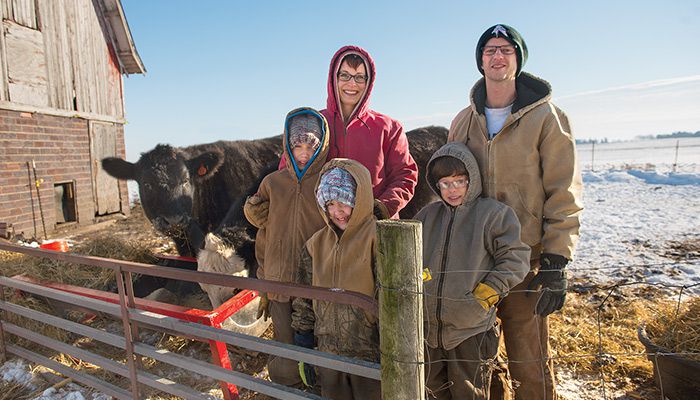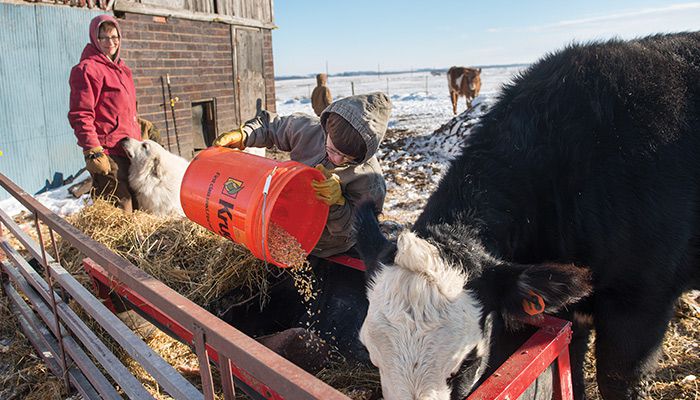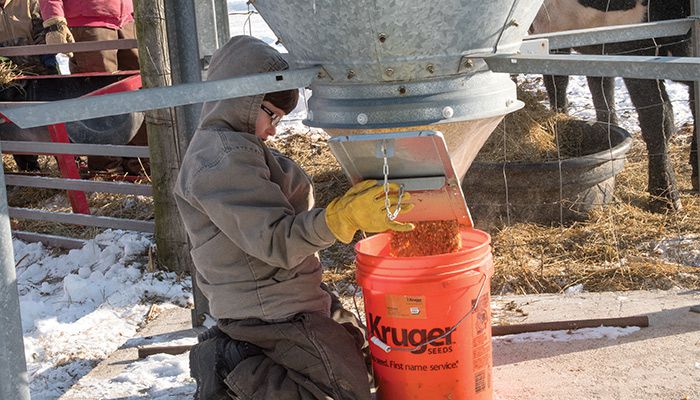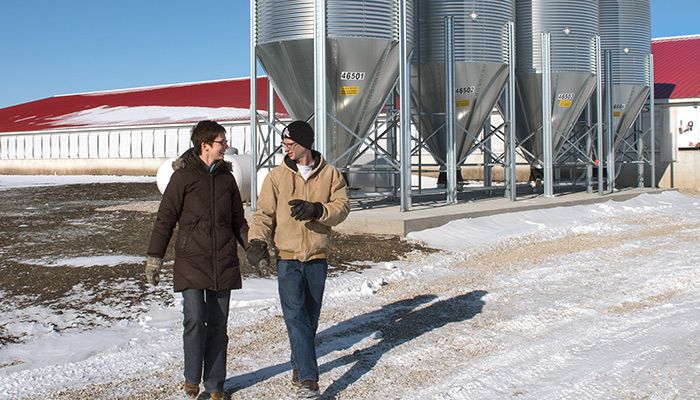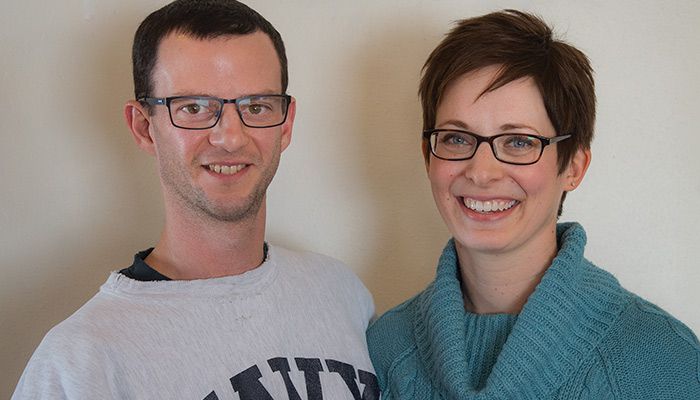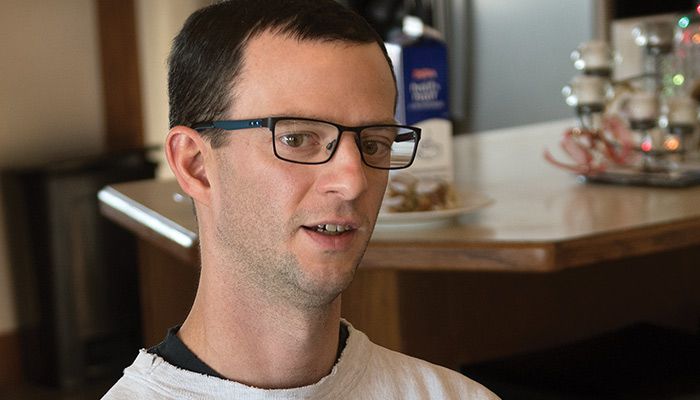Livestock is the key to keeping young people in Iowa agriculture
Author
Published
1/10/2017
Through college and seminary, Grant kept a connection to the farm. He purchased about 100 acres of land in Wright County after his great-uncle died, and worked seasonally with his father to plant and harvest.
"I wasn’t tremendously involved in the farm because of being in college and being in the seminary," Grant said. "Between college and seminary, it took us 10 years."
After seminary, they settled in the West Des Moines area and both were pastors at the Lutheran Church of Hope, one of the nation’s largest Lutheran churches. But several things, like Nicole’s breast cancer diagnosis and subsequent treatments and surgeries, prompted them to consider a move to the farm.
"By the time the treatments and surgeries were done, we thought it was time, the age to move the kids to the farm if we wanted that lifestyle," Nicole said.
They eventually settled on a farm outside of Clarion, a few miles from where Grant’s parents live.
Making farming work
They found jobs as pastors in local churches, then they had to figure out how to make the farming work. "We knew it wasn’t going to work financially just to come home and farm, even if that just meant renting the family ground to farm," Grant said.
"With the (grain) prices the way they were, it was pretty challenging," Nicole added.
Nicole, who grew up in Newton, had an idea of what she wanted the farm to look like: a few cows, some pigs, dogs and cats. But her uncle, a pig farmer, convinced her that that couldn’t support their family.
He showed them his budget worksheets and financing information and the income he receives by raising pigs under a contract by working with a livestock production company, often called an integrator.
Grant and Nicole did more of their own research, and while they recognized that there are were a lot of options for raising pigs, they determined that raising pigs under a contract was the best fit for their family. "We think it’s an ideal partnership for what we were looking for to make our family farm more diversified and continue for the next generation," Nicole said.
Helping the transition
And, Nicole said, the integrator’s representative, who lives in the county, has helped them transition from suburban life in West Des Moines to life in rural Wright County.
"The entry into livestock as a livelihood was a steep learning curve, and still is," Nicole said. "But we’re proud of being farmers and adding to this operation."
They are also happy to be a part of their rural community, where Grant was raised, and buy from local businesses and enroll their kids in the local school.
Contacting CSIF
To get started, the Woodleys worked with the Coalition to Support Iowa’s Farmers (CSIF) to determine the best site for the barns that would not only meet and exceed state and local rules and regulations, but one that would be the best fit for the environment.
"Giving the coalition a call and meeting with them was one of the best steps of the process that we started last January," Grant said.
Using mapping programs and other resources, the coalition staff helped the Woodleys identify the best location for their hog barns.
Like other livestock farmers in Iowa, the Woodley family had a set of rules and regulations to follow prior to building their hog barns.
Before building, their plans went through local, county, state and federal rules and regulations. They followed a master matrix, a scoring system adopted by Wright County that’s used to evaluate the siting of permitted confinement feeding operations.
Before the Woodleys could be approved for construction, they had to earn points on the master matrix for choosing sites and using practices that reduce adverse impacts on the environment and the community, according to the Iowa Department of Natural Resources.
Visiting with neighbors
The Woodley family also visited with nearly a dozen neighbors to communicate their plans for their livestock farm.
"We assured them lines of communication were open, and if there was anything they wanted to voice, they are certainly welcome. It’s important to us to be good neighbors, so we want to address those concerns," Grant said.
Working with Crown Prairie, a North Carolina-based company, the Woodley family built two, 2,400-head hog barns.
Before the pigs arrived on Oct. 1, 2016, the family invited neighbors inside the barn to learn more about how pigs are raised today.
"The open house helped answer questions about modern hog farming," Grant said.
Getting a start
David Baker, farm transition specialist at the Beginning Farmer Center, said raising livestock is still one of the best ways for young farmers like the Woodleys to get back to the farm.
"I think livestock is the key for any young person getting their start in farming," Baker said. "Younger entrants would not have the assets to dive into a high-cost, low-return land type of proposal as opposed to the lower capital required but faster return for livestock."
The contract allows the Woodleys to concentrate on animal care.
"It’s in everybody’s interest to grow healthy pigs," Grant said.
And being good stewards of the land and their animals is equally important, Nicole said.
"Our integrator has shown us how they care about the animals, too, by training us in how to care for these pigs," she said.
Baker said young people also have energy on their side.
"Livestock often requires more labor, so that’s what the younger person will have plenty of: ambition, labor and energy," he said.
The kids are involved
Grant and Nicole’s kids, Junia, 7, Sam, 9, and Dietrich, 10, have plenty of interest and energy to help care for the family’s livestock.
Dietrich enjoys helping his dad do pig chores. He’s learned about biosecurity and the importance of keeping his animals healthy.
Junia understands that chores and animal care come first before other activities.
Sam enjoyed raising a bucket-bottle calf for the county fair, but understands that they have more than just seasonal 4-H animal projects on the farm; livestock on the Woodley farm is a year-long commitment for the family.
"There is something very remarkable about your kids and you learning alongside one another how to care and tend to animals’ needs," Nicole said. "And you can’t teach that any other way."
This is second part of a special two-part Spokesman report on the important role that livestock production plays in Iowa’s economy. You can access a number of other articles on livestock, as well as videos, photos and graphics, on our Spokesman Extra web page at: iowafarmbureau.com/spokesmanextra .
Sharing their farm story
Grant and Nicole Woodley have created a blog to share their farming adventures with friends and family all around the world. In their blog, Tendingseedsofgrace.wordpress.com, they share their experience raising livestock and growing crops and kids in rural Wright County.
The Woodleys enjoy telling their farm story, and have even been involved in a Skype discussion with a Bible study group.
“We are proud of being farmers and to add this operation,” Nicole says. “We like to show other people what we’re up to.”
Photo Gallery:
Want more news on this topic? Farm Bureau members may subscribe for a free email news service, featuring the farm and rural topics that interest them most!
